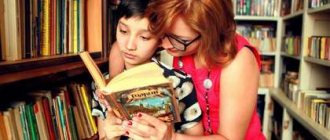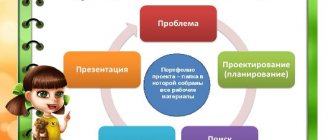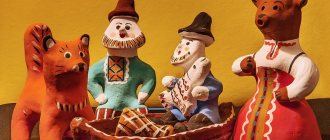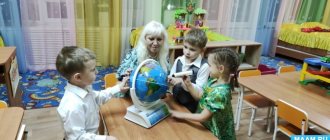Project activities as a means of introducing preschoolers to fiction.
Modern education is at a new stage of development - it is being modernized. In this regard, the educational institution is focused on a creative, successful person, so updating the content of preschool education, technology and quality systems is natural.
Introducing the younger generation to literature is one of the priorities of modern education. Reading works of literature is considered today as an essential element of culture. Meanwhile, a number of negative trends in the field of children's literature and children's reading have recently emerged. The active introduction of computer and information technologies into a child’s life reduces the status of literature, and the share of reading in the structure of children’s free time is sharply reduced.
Parents who read are role models. But at present the family is in a state of crisis, and due to a number of objective reasons its influence on the formation of a child reader is difficult. This process is facilitated by the lack of proper attention to the process of developing the child’s reading interest on the part of the father and mother. Children have little in common with books, and this is reflected primarily in their intelligence, literacy, moral and emotional development.
Through fiction, we introduce the child to the values without which the spiritual life of society and the individual is impossible. Currently, this is very important, since society is experiencing a moral and moral crisis.
The Federal State Educational Standard for Preschool Education includes the task of familiarizing preschoolers with book culture in the educational field of speech development, the main goal of which is to develop children’s interest and love for books, and to educate future readers [2, clause 2.6. Federal State Educational Standard DO].
Based on this, we can conclude that the state and society have put forward requirements for introducing students to fiction, but in practice it is impossible to fully introduce them, since:
- the child shows no interest in fiction;
- the child is careless with the book;
- there is no system in working to introduce preschoolers to fiction;
- indifference on the part of parents to the process of introducing preschoolers to fiction.
This problem requires an immediate search for a solution, since fiction is the basis on the path to knowledge. In our kindergarten, much attention is paid to project activities, which, of course, is one of the effective ways to solve this problem, because it is in project activities that such important principles as cooperation between the teacher and children and the principle of joint development are combined. Another important detail is that it is the method of project activity that gives children the opportunity to independently acquire and synthesize acquired knowledge, develop creative abilities, and communication skills. Another undoubted advantage of this method is that it allows parents of preschoolers to be involved in and reveal the values of joint creativity with their children, as well as increase their competence in introducing preschoolers to fiction.
From the work experience of teachers at MBDOU “Kindergarten No. 397” g.o. Samara: Passport of the project “In the World of Fairy Tales”
Project title : “In the world of fairy tales.”
Type of project: educational - creative.
Project developer : Efremova Natalya Aleksandrovna, Mukhankina Yulia Viktorovna, Pulargina Anzhelika Sergeevna, Surikova Olesya Vitalievna
Project participants: educators, preschoolers, parents.
Project duration: 3 months
Problem : Lack of interest in reading fiction.
The goal of the project : introducing preschoolers to fiction, educating the future reader.
Main goals:
- introduce children to a variety of different literary genres (fairy tales, stories, poems), folklore works (counting books, nursery rhymes, chants, lullabies, riddles, proverbs, etc.)
- cultivate the need to communicate with books, a culture of reading, and respect for books.
- develop children's speech, expand their horizons and vocabulary.
- involve children in speech, music, art, and play activities related to the image structure and plot of a fairy tale;
- develop memory, imagination, attention;
- form an emotional response to literary works.
Forms of work on the project:
With kids:
- reading and viewing fiction;
- conducting didactic, verbal, role-playing games with children;
- dramatization of fairy tales with children;
- conducting GCD;
- independent visual activities based on fairy tales (drawing, coloring, modeling, appliqué).
With parents:
- familiarization with consultations, recommendations, advice;
- Involvement in participation in creative work carried out jointly with children.
Expected results:
Metasubject:
- Cognitive:
- the preschooler is familiar with works of children's literature;
- children have an idea of what and how books are made, what great value they have for understanding the world;
- the cognitive interest of preschoolers is formed;
- the vocabulary of preschoolers is enriched;
- Children have a fairly good command of oral speech.
2. Communication:
- the child has developed a stable interest in books and fiction;
- preschoolers have developed the ability to coherently, consistently and expressively retell short fairy tales and stories;
- Every child is involved in creative activities.
3. Regulatory:
- the child understands that books must be taken care of.
4. Personal:
- a preschooler shows initiative and independence in various types of children's activities, play and communication;
- preschoolers have formed an emotional attitude towards literary works;
- Children are emotionally developed, able to empathize, and inquisitive.
Result, product of project activity: production of a tabletop puppet theater, drawings, crafts, appliqué work.
Development prospects:
- introducing preschoolers to various works of fiction and folklore;
- introducing preschoolers to fiction;
- enriching the “reading experience” of children through works of various genres of folklore (chants, fables, counting rhymes, fairy tales), literary prose (stories with moral overtones) and poetry (author’s riddles) - expanding children’s horizons;
- increasing parental competence in introducing children to fiction;
Stage 1: Preparatory:
- Conduct a survey of children “Through the pages of fairy tales”;
- Questioning parents “The role of fairy tales in raising children”;
- Defining the topic, purpose, content of the project;
- Select sources of information
- Set certain tasks.
- Determine the project timeline.
Search for materials on this project topic. Selection of fiction. Selection of illustrative material on the topic of the project. Learning poems about animals and fairy tale heroes. Selection of information material for the parents' corner. Development of notes on cognitive, speech and creative knowledge. Selection of board and printed games, finger games, didactic games, figurines of fairy tale heroes. (2 weeks. During regime moments.)
Stage 2: Practical activities:
- Conversations “What fairy tales do I know”; acquaintance with Russian folk tales (“Teremok”, “Ryaba Hen”, “Rukavichka”, “Fox with a rolling pin”, “Three Bears”)
- Examination of illustrations for fairy tales;
- Organization and conduct of modeling classes: “Modeling fairy tale heroes” - examination of illustrations for fairy tales;
- Organizing and conducting classes in modeling “Treats for the animals”, “Logs for the tower”, “Forest and garden apples”;
- Organization and conduct of drawing classes - non-traditional drawing - “Tree of Friendship” (blotography); decorative drawing" Decorate the mitten", "Beautiful rolling pin for the fox";
- Dramatization of Russian folk tales at the request of children;
- Construction: “Beds for three bears, “Teremok for animals”, “House for Ryaba’s chicken”
Musical activity: Learning songs from fairy tales
Game activity: “Correct the mistake.” Goal: to develop the ability to reconstruct events sequentially from present pictures. oven game “Fairytale Lotto”, “Tale after Tale”, “Fairytale Carousel”, “Geese-Swans”, “At the Bear in the Forest”.
—Memorization of folklore works (proverbs, chants, counting rhymes, tongue twisters, etc.).
- To develop the ability to evaluate the actions of fairy-tale characters
- Develop memory, imagination, attention.
- Cultivate a love of fiction.
- Cultivate a desire to listen and remember fairy tales.
- Cultivate a sense of empathy and kindness.
- Develop skills in handling books carefully.
Maintain interest in dramatizing favorite fairy tales. Learn to convey the structure of a fairy tale using modeling. To develop the moral qualities of preschoolers. To develop interest in theatrical and play activities. (3 months During regime moments.)
Stage 3. Working with parents:
- Consultation “The role of fairy tales in the education of preschool children”;
- Visual and informational cooperation “What and how to read to children at home”;
- Conducting a parent meeting using ICT technologies: “Family reading to children”;
- Drawing competition “My favorite fairy-tale hero.”
Joint creativity with children: making “baby books” based on their favorite fairy tales. (3 months).
Stage 4 Final.
Project results: Production of a tabletop puppet theater; Exhibition of drawings; Exhibition of “baby books”.
To summarize, I would like to note that project activity in the process of introducing preschoolers to fiction is a fairly successful method of activity for our teachers. Positive results were noted. The level of development of interest in fiction on the part of preschoolers has changed positively.
Children began to show interest in listening to literary works more often. With great pleasure, the preschoolers began to analyze the text, answering questions about the work they had read. Children began to take more active part in games - dramatizations of works of art based on text, to show creative initiative in reproducing the plot, creating images of heroes.
Children successfully master the program material, use the acquired knowledge, skills and abilities in direct educational activities, educational activities during routine moments, and in independent activities. The vocabulary of preschoolers has been enriched. Children develop a sufficient level of dialogic and monologue speech, which parents readily note. Preschoolers have become more emotionally responsive, friendlier, and more inquisitive. Children began to treat books more carefully. In conclusion, I would like to note that no one has ever been given a love for a book from birth, therefore, in order for a child to fall in love with it, a lot of serious work is needed.
Literature: 1. Ushakova O. S. Introducing preschoolers to fiction. - M.: Publishing house. Litera, 2012. 2. Kurbatova S. I. Experience of gender education of children through exposure to fiction / S. I. Kurbatova // Preschool pedagogy. - 2012. - No. 3. 3. Obnosova Kh. A. Introducing children to fiction in modern society // Culture and education. - May 2015. - No. 5. 4. Migunova E. V. Theatrical pedagogy in kindergarten. - M.: TC Sfera, 2009. Kiseleva L. S. Project method in the activities of a preschool institution: a manual for managers and practical workers of preschool educational institutions / 5th ed., revised. and additional - M.: ARKTI, 2010 - 95 p. 5. Solodyankina O. V. Design system in a preschool institution: a methodological manual. - M.: ARKTI, 2010 - 78 p. 6. Veraksa, N. E. Project activities of preschoolers: a manual for teachers of preschool institutions / N. E. Veraksa. - M.: Mozaika-Sintez, 2014. 7. Veraksa, N. E. Approximate general educational program for preschool education “From birth to school” / N. E. Veraksa. - M.: Mozaika-Sintez, 2022. 8. Law of the Russian Federation on Education. Order of the Ministry of Education and Science of the Russian Federation (Ministry of Education and Science of Russia) dated October 17, 2013 No. 1155 Moscow 9. “On approval of the federal educational standard for preschool education.” The concept of spiritual and moral development and education of the personality of a Russian citizen. 10. website of the Ministry of Education and Science of the Russian Federation. 11. website of the Ministry of Education and Science of the Samara Region.
Author: Mukhankina Yu.V.
Photos: Pexels
Tags:Books by Mukhankin Yu.V. Preschool experience Social and communicative development
Project “Reading with Passion”
Municipal budgetary preschool educational institution kindergarten No. 8 “Mosaic”
Project
"Reading with passion"
Compiled by: Head of the Educational Organization “Reading with Passion”
Teacher-psychologist Kirina T.V.
Gremyachinsk, 2022
“If a child has not developed a love for books since childhood, if reading has not become his spiritual need for the rest of his life, during his adolescence the soul of a teenager will be empty, crawling out into the light of day, as if something bad had come from nowhere” V.A. Sukhomlinsky
Relevance of the project:
In modern society, the role of television, computers and other technical means in the lives of parents and their children is increasing. Therefore, at present, communication between parents and children and the role of reading in the family are being downplayed. Today, many people do not read books, which indicates a significant decline in the population’s literacy and loss of interest in literature. It is a book that is a source of knowledge, development and understanding of the world for a child; reading helps a child to assimilate material, develop speech, memory, and thinking. Psychologists and educators are sounding the alarm. Modern preschoolers speak poorly, and the number of children with speech disorders is increasing every year. Mastering correct speech by preschool children will create a reliable foundation for their successful learning. It is necessary to develop a child’s need for reading as a source of further development.
At preschool age, the little reader takes his first steps into the world of great literature. Parents and educators become guides for children. It largely depends on the adult whether the child will become a real reader or whether encountering a book in preschool will become a random, meaningless episode in his life. Family reading is of particular importance for a child’s reading destiny. Listening to an adult read, looking at book illustrations with him, the child actively thinks, worries about the characters, anticipates events, and establishes connections between his experience and the experience of others. Reading together brings adults and children together, stimulates and fills rare and joyful moments of spiritual communication with content, and cultivates a kind and loving heart in a child. Family reading traditions are a very important part of the family education system. And you shouldn’t think that it will become a thing of the past because, that is, television, computer and other sources of information. Family reading is not a way to get information, it is the most important and best way of communication and unobtrusive education, which is the most effective. Parents, through family reading, help to instill an interest in reading in children.
Project type:
creative




